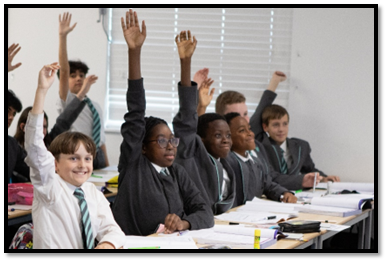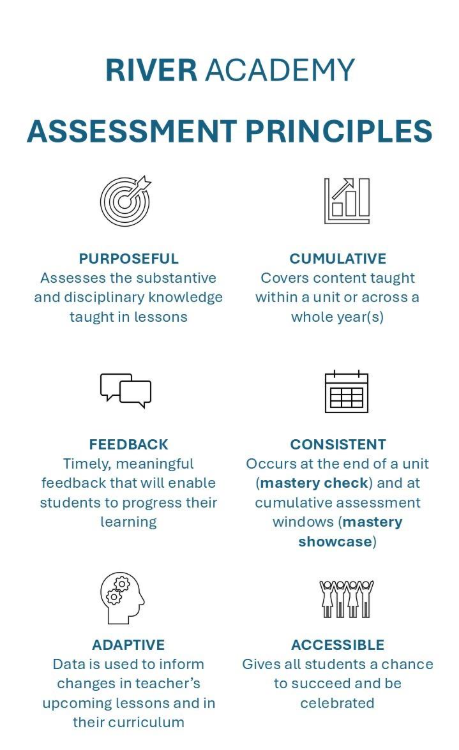Learning, Teaching & Assessment
A Calm, Purposeful Environment Where Students Can Thrive
River Academy is an incredibly special place. From the outset, we have been designed to be a calm, orderly school where exceptional behaviour creates the foundation for outstanding teaching, learning, and personal growth. Our culture is built on kindness, respect, and high expectations — values that are lived every day by our students and staff.
In every classroom, students are inspired by passionate teachers who are experts in their subjects and deeply committed to helping every child succeed. Clear routines and consistent boundaries support students to develop focus, confidence, and pride in their learning. This structured environment allows every student to thrive — academically, socially, and emotionally.
Our students benefit from exceptional facilities on a modern, purpose-built campus. Every space — from our well-equipped classrooms and specialist science labs to our ICT suites, sports facilities, music rooms, and drama studios — has been designed to support high-quality teaching and a rich, engaging curriculum.
Teaching and Learning
Teaching pedagogy across the school is aligned to ensure that, firstly, we are delivering the curriculum in the most effective way possible, and secondly, so that the routines of lessons are ‘normalised’, allowing teachers to focus on the students in front of them, and students, the task at hand.
Our framework for teaching and learning brings the very best of evidence- and research-led practice together, inspired by literature like that of Teach Like A Champion, by Doug Lemov, and Teaching Walkthrus, by Tom Sherrington and Oliver Caviglioli, as well as the practice of high performing schools like that of Michaela, and Ark Soane Academy.
100% Participation
At River Academy we know that every student needs to be actively engaged and challenged in order to make exceptional progress. Teachers skilfully use a range of strategies to ensure that this is the case.
In every classroom, all students are expected to maintain high levels of focus through the tracking of the speaker and expert listening behaviours. This focus is routinely checked through follow up questioning and activities which ensure that there is no opt out, but instead, deliberate thinking and responses.
All students participate in all hands up questioning, turn and talk partner discussions, as well as choral responses.
Every classroom at River Academy has high levels of challenge and rigour, and high levels of enjoyment. We do not apologise for the fact that learning can be difficult, instead we take joy in the challenge that it presents, supporting every time to achieve their very best.
Reading for Success
Reading is a fundamental part of life at River Academy.
Reading is explicitly taught and practised in tutor time and in lessons across the curriculum. Students are taught specific routines to support their reading, including ‘Ruler Reading’.
We ensure that students read widely beyond lessons. All students carry their own personal reading book, complete weekly Sparx Reader tasks and collectively engage in their ‘Tutor Read’, a carousel of age-appropriate engaging texts which can be shared and enjoyed together. There are also enrichment opportunities for students to engage in, including Book Clubs and The River Canon.
For our weakest readers, phonics support and intervention is accessed.
Assessment
Assessment is an ongoing process, without which teachers cannot meet the needs of their students. Assessment at River Academy:
-
Is based on an understanding of individual students’ starting points and targets.
-
Informs teachers how lessons should be planned and delivered, and how curriculum should be modified over time.
-
Ensures each student knows the quality of their learning, their strengths and what they need to do to improve.
Assessment at River Academy follows 6 guiding principles.
Formative assessment
At River Academy, we prioritise the use of daily formative assessment (assessment for learning) as this is the most efficient mechanism to diagnose what students do or don’t understand. Teacher’s lessons are quickly adapted to respond to the outcome of this data.
Formative assessment comes in the form of (but is not limited to):
-
Mini white boards
-
Choral response
-
Cold calling
-
Hands up questioning
-
Do now activities
-
Turn and talk
-
Independent (silent) work
Following independent work, teachers will make use of self and peer assessment to engage students in the development and improvement of their work. This should be visible in green pen, as it enables teachers and students to quickly identify what work required adjustment.
Summative assessment
At River Academy, we recognise that summative assessment is an important tool to measure students’ progress over time. Summative assessment comes in two forms: an end of unit ‘mastery check’ assessment, and a cumulative ‘mastery showcase’ assessment.
All students will sit mastery showcase assessments in all subjects at two specific times in an academic year. Mastery check assessments, however, will differ in frequency by subject, but should happen at least once per term.
Summative assessment is split into two parts: the short answer ‘recall’ phase and the extended answer ‘application’ phase. The specific activities within these parts might look different between subjects, but generally they will include:
Part A – Recall |
Part B – Application |
|
Substantive knowledge Short answer questions Multiple choice Key vocabulary 1-mark questions |
Substantive knowledge Disciplinary knowledge Long answer questions Graph questions More than 1-mark questions |
In mastery check assessments, students are assessed on the knowledge and skills they have been taught within a specific unit, whereas mastery showcase assessments should include content that has been taught across a students’ time at River Academy.
Feedback after a summative assessment should be delivered to the whole class (whole class feedback). It should include whole class:
-
Strengths
-
Misconceptions
-
Literacy errors
-
A structured extended activity that targets the observed misconceptions.
In Years 7 and 8 students do not receive a grade from their summative assessment and instead receive a percentage score. In the mastery showcase, they also receive the average percentage score of their cohort, which they can use to estimate their attainment against their peers.
Reporting Home
In Years 7 and 8, parents will receive 3 reports per year. These are called DCPs (Data Collection Points). Each report will outline the students’ current attainment and attitude to learning across each of their subjects.
Attainment is benchmarked by 4 categories, each relating to the age-appropriate subject curriculum and associated skills:
-
Excelling
-
Deepening
-
Securing
-
Beginning
Attitude to learning is categorised 1 to 4, with 1 recognising a ‘love of learning’ and a ‘high level of enthusiasm’.
As well as this, students’ outcomes in their mastery showcase assessments (which take place twice a year) are reported home, alongside the average percentage score of their cohort, which can be used to estimate their attainment against their peers.
After each report students are encouraged to reflect on the progress that they are making and identify areas in which they have done well and areas in which they can improve. This is supported by work in tutor periods.
Parents provide an essential support in this process by helping their child reflect honestly about their progress and set themselves suitable targets for improvement.


